The Expression of p53 and Survival of Extranodal NK/T-Cell Lymphoma, Nasal Type (ENKL) in Thai Patients
Keywords:
Extranodal NK/T-cell lymphoma, Nasal type, Survival, p53Abstract
Objective: To determine the association between p53 expression and disease parameters, treatment responses,
and survival of Thai patients with extranodal NK/T-cell lymphoma, nasal type (ENKL). Materials and Methods:
Adult patients with ENKL at Songklanagarind Hospital from 2001 to 2012 were reviewed. Clinical parameters and
outcome data were extracted. The available pathological specimens were immunochemically stained for p53.
The results were analyzed for association with disease stage, prognostic scores, treatment responses, and overall
survival. Results: Twenty-four patients (17 males and 7 females) were included for the study. The median age
was 52 years. Most patients were under 60 years old (71%), had ECOG scores 0-1 (92%), stage I-II (92%), low
to low-intermediate International Prognostic Index (IPI) (92%), and low Prognostic Index for PTCL, NOS (79%).
All patients presented with extranodal lesions, most commonly nasal lesions (83%). Seventy percent of patients
were treated with chemotherapy, predominantly (94%) CHOP regimen and 54% percent with radiotherapy,
alone or as concurrent chemo-radiation. Of 18 evaluable patients, the overall response rate was 67%, with 56%
complete response. The p53 expression is detected in 92% of tumors and significantly correlated with limited
stage and low IPI. The median overall survival (OS) was 16.8 months. Advanced stage, high IPI, radiotherapy,
and response to treatment, but not p53 expression, are associated with lower OS. With Cox regression analysis,
radiotherapy and response to treatment were independent prognostic predictors for survival. Conclusion: p53
is commonly expressed in ENKL and significantly associated with limited stage and low IPI. Radiotherapy and
response to treatment were predictors for survival.



